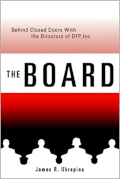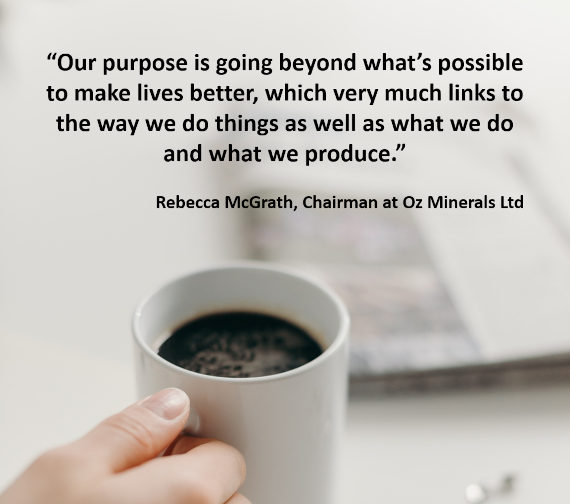|
|
|
|
|
|
|
|
|
Dear reader,
Welcome to the April 2021 edition of The Director's Dilemma. When I look at the over 1,000 pieces of legislation in Australia that can impose a penalty on individual directors it seems, perhaps, quite fitting that this newsletter is coming to you on April Fool's day. I am committed to working with boards and directors to help them understand and perform their complex roles and drive great performance in their organisations. Contact me if you would like help with your board.
Each month this newsletter looks at a real-life scenario that happened to a board, perhaps to a board like yours, and considers a range of responses. I want to help you with practical director issues without the risks that attach to living these situations in real-life. The scenarios are de-identified to protect the individuals concerned.
This month we look at how to proceed as a director when staff make you privy to information that might not be aligned with the CEO's chosen direction.
To read this email in a web browser, go to www.mclellan.com.au/newsletter.html and click on 'read the latest issue'. I hope you will enjoy the latest dilemma:
 Faizan is an early stage investor in tech companies and has accepted a seat on the board of a company that makes software which can track people in crowds. He has made a large (for him) investment in the company and is happy because the market for the software has been boosted recently by building managers who want to ensure that staff contacts can be accurately traced. Faizan is an early stage investor in tech companies and has accepted a seat on the board of a company that makes software which can track people in crowds. He has made a large (for him) investment in the company and is happy because the market for the software has been boosted recently by building managers who want to ensure that staff contacts can be accurately traced.
The company has been approached by the government, with a request to install the software in some transport hubs and a popular town square. The CEO is delighted and very excited about developing a new capability to identify people, who are not on a database of building users, and to track their movements from one software location to another.
Some of the staff are not happy with this. They fear it could be used in future to allow spying and breaches of civil rights, especially if it is later sold to other governments. Their dissent has reached Faizan and he is aware that they are thinking of refusing to develop the software with this more extensive capability. Some of the best engineers could leave and join rival firms; others could simply flatly refuse to complete the project. The contract has been drawn up and is scheduled for board discussion in a couple of weeks.
Faizan has asked the CEO and the chair to meet with him, privately, to discuss a concern. The meeting is set for tomorrow. Faizan isn't sure how to best communicate his apprehension. His fears are not yet truly formed. What should he say?
|
|
|
|
Brian's Answer
 Faizan should not be surprised by the dynamics. These dynamics are common to companies since at least the Vietnam War (if not two centuries earlier with religious objections to the African slave trade) and, in big tech, at least since Google's "Don't be Evil" statement. Faizan should not be surprised by the dynamics. These dynamics are common to companies since at least the Vietnam War (if not two centuries earlier with religious objections to the African slave trade) and, in big tech, at least since Google's "Don't be Evil" statement.
To resolve this dilemma, it helps to gain three broad types of knowledge.
First, understanding the commercial viability of the solution the government is requesting. Will the interest turn into a purchase order? How many other governments will purchase? What's the company's return on investment? Will it distract from opportunities with a higher return?
Second, internally with team members, understanding the real problem through conversations and questions. For example, in the minds of the employees, how does virtual tracking compare to physical tracking? How does virtual tracking on one website compare to tracking across websites? How easily can people opt out of or avoid being tracked? What is the cost or benefit to a person from being tracked or not? How does physical tracking at one building or space compare to tracking across locations? How easily can a person opt out of or avoid being tracked? What do government employees and elected officials know that we don't know? After conversation, education and understanding the real problem, it will become clearer who objects to what and why.
Third, how much of a financial loss would arise from replacing that employee(s)?
Answers enable considering options for the path forward.
Brian Barnier is a senior advisor/advisory board member to multiple growth companies. He advises and trains public company board members through Boardwise and partnerships with BoardProspects, Watermark and Women Corporate Directors in AI-ML, cybersecurity, risk, and finance. While at Lucent Bell Labs (now Nokia) he led teams to 6 patents in location-based services. He is based in New Fairfield, Connecticut, United States.
|
|
|
|
Julie's Answer
 Faizan is right to speak with the Chair and CEO while his 'fears are still not fully formed', it sets the stage for building a shared understanding of the problem, followed (hopefully) by an agreed solution. Having the courage to raise an uncomfortable question when you don't yet have your own answer prepared is a great trait for a company director. Faizan is right to speak with the Chair and CEO while his 'fears are still not fully formed', it sets the stage for building a shared understanding of the problem, followed (hopefully) by an agreed solution. Having the courage to raise an uncomfortable question when you don't yet have your own answer prepared is a great trait for a company director.
Approaching the issue with a values-based judgement might cause friction, especially if the CEO and Chair have already made up their minds. It is important that Faizan keeps an open mind whilst contributing insights to help navigate towards the best solution.
I would recommend sharing the facts and asking the Chair and CEO to help evaluate the potential business impact of each of several different scenarios.
Faizan should consider:
• How this new development aligns with privacy and other laws
• The size of the potential market for this software
• Data security and accuracy of the software
• The depth of staff feeling and if this will be assuaged by inclusion in the process
• Availability of skills to replace current staff if they leave
• Potential safeguards, such as an agreement to license the software on a site by site basis or to not sell the software to non-democratic governments, etc.
Whatever the outcome in this case, matters have progressed to a point where the board is reacting to, rather than pre-empting developments.
Faizan's board should develop a policy rather than respond on a case by case basis. In future, the strategic implications of any major new product development should be discussed with the board as they arise, when the directors can contribute, rather than at a late stage when the contract is ready for signing and just needs board approval.
Julie Garland McLellan is a non-executive director and board consultant based in Sydney, Australia.
|
|
|
|
Tony's Answer
 Faizan should: Faizan should:
-
Take a long-term view of the Company and its market positioning and formulate a strategy with the CEO to take account of ESG considerations as well as the reputational impact.
-
Make a judgment which balances ethical and financial considerations; the board cannot be seen as trading its espoused values for money.
-
Remove the emotional aspect (fear of not making money and anger that may be felt by the CEO and Chair towards the employees) and factually outline the ethical concerns of the employees and threats to leave or stop development. Feedback should be anonymous manner to protect employees from possible future retaliation / targeting.
-
Seek to understand if and how concerns over privacy/ethics, and potential departure of key employees might be addressed internally, and with Government.
-
With the CEO and Chair, determine if the software will also subject the organization to regulation and how might that impact the organization.
-
Suggest forming a Task Team including a government representative and the company legal council to discuss the matter and develop contingency plans.
-
Recommend the development of a Stakeholder Engagement Strategy to actively communicate with media, key stakeholders, regulatory bodies etc to mitigate the risks should this leak.
-
Develop a clear and detailed action plan to address concerns – this will look at impact of employees leaving, steps taken to tweak development of the software to address ethical concerns while still fulfilling government mandates, government regulation, and media scrutiny.
-
Set out the above concerns, request more information, and widen the debate if necessary to include other board members.
Tony Leng is Chairman of VaultBank and Managing Director and Practice Leader at Diversified Search Group / AltoPartners. He is based in San Francisco, USA.
|
|
|
|
Julie’s News
Podcast interview - I was delighted to be interviewed by Amber Daines on her podcast on The Politics of Boards. The discussion touched on the practicalities as well as the politics and I hope you will find it interesting. Please comment on Spotify or Apple podcast.
Book Review – The Board: Behind Closed Doors with the Directors of DFP, Inc. by James R. Ukropina

Boards are secretive. Although transparency and open disclosure are de rigueur for business activities, the boardroom is shrouded in a veil of confidentiality. Minutes are rarely a full transcript and, unless you are in the room at the time, you won't know how decisions were reached, who said what, to whom, how or why.
This raises a pertinent question: how can directors know what a board would be like before they have joined it?
This book answers that question.
The book follows the development of publicly listed DFP, Inc., as it grows, suffers setbacks, rebuffs takeovers, manages dissident directors and adapts to the changing governance demands. Everything is included, from sexual harassment to social responsibility. The board is hypothetical (of course) and the company doesn't exist, but after a few chapters you will feel as if you belong at that table and have a part to play in all that transpires. Thanks to the author's personal experience, characters and actions are believable.
And it is a lot cheaper learning from a book than learning from personal experience!
Available at Amazon.com
The AICD Australian Governance Summit - It was such a delight to join this summit in person. These two days have long been a highlight of my annual calendar. This year it was such a treat to be at an in-person event after so many long online meetings. Tesla Chair, Robyn Denholm, was a highlight with her tips on how boards can catalyse innovation and growth. For most, the address by Woolworths Chair, Gordon Cairns, was highly engaging and utterly delightful in its candid exposure of the things that went wrong as well as the many things that went right.
Inspirational quote for April

Something to think about as you have your coffee; how does your board ensure that everyone in your company is working to improve lives?
Do you know where to focus for maximum impact? - boards often struggle to get cut through and drive company performance. They work hard, then they work harder, then call in a consultant who recommends some changes, then they work harder still.
If that sounds like your board, don't worry. It is likely that you have simply been focusing on the wrong stuff. I have made a diagnostic tool that might help you to prioritise the actions that will free your board from the drudgery and allow you to maximise your impact. You can take the diagnostic here: https://directorsdilemma.scoreapp.com
Call me afterwards for help with revitalising your board.
A note on names - A few readers have asked me where I find the names for the protagonists in each case study; I 'borrow' them from people I meet or things that I read. Faizan is a male name of Arabic origin and means beneficial or generosity. Our protagonist Faizan will need to ensure that he is working from an ethos of generous and beneficial service in determining how to approach this contract and his fellow board members.
This newsletter - If you have any ideas for improving the newsletter please let me know. If you are reading a forwarded copy, please visit my website and sign up for your own subscription.
Suggestions for dilemmas - Thank you to all the readers who have suggested dilemmas. They are greatly appreciated. I will answer them all eventually. I could not write this newsletter without your help and without the generous help of all the experts who respond each month to the case studies.
Be a contributor - If you would like to attempt a response to the dilemmas for publication you will be most welcome. Simply reply to this email and let me know.
Let's connect - I use LinkedIn to share information about boards and directorship with my friends and acquaintances. If you use LinkedIn and we are not yet connected I will welcome a connection from you. You can find me at linkedin.com/in/juliegarlandmclellan.
Let me help you - I would be delighted to speak for or train your board, staff, audience and/or group. If I can help, please contact me at julie@mclellan.com.au.
Farewell until the next issue due 1 May 2021. I look forward to greeting you again then. In the interim I hope you will enjoy health, happiness and hard work.
Enjoy governing your companies; we are privileged to do what we do and every day is a blessing!
Best regards,
Julie

Main photo and quote photo by cottonbro from Pexels
Photo Credits: Personal images in this newsletter are provided courtesy of the contributors, course attendees and conference participants.
Disclaimer:
The opinions expressed above are general in nature and are designed to help you to develop your judgement as a director. They are not a definitive legal ruling and do not constitute legal advice. Names and some circumstances in the case study have been changed to ensure anonymity. Contributors to this newsletter comment in the context of their own jurisdiction; readers should check their local laws and regulations as they may be very different.
Privacy: I am privileged to have your contact details and keep them as safely as possible. I will alert you if they are ever accessed by any unauthorised person (the technical staff at ayuda help with publishing and issuing the Director's Dilemma and have access so they can send the newsletters to you). I do not sell your details to anyone; they are kept only for the intended purpose - sending you this newsletter and helping to build the judgement of company directors by providing a safe way to consider potential responses to real life events.
|
|
|
|
|
|
|
 Faizan is an early stage investor in tech companies and has accepted a seat on the board of a company that makes software which can track people in crowds. He has made a large (for him) investment in the company and is happy because the market for the software has been boosted recently by building managers who want to ensure that staff contacts can be accurately traced.
Faizan is an early stage investor in tech companies and has accepted a seat on the board of a company that makes software which can track people in crowds. He has made a large (for him) investment in the company and is happy because the market for the software has been boosted recently by building managers who want to ensure that staff contacts can be accurately traced.
 Faizan should not be surprised by the dynamics. These dynamics are common to companies since at least the Vietnam War (if not two centuries earlier with religious objections to the African slave trade) and, in big tech, at least since Google's "Don't be Evil" statement.
Faizan should not be surprised by the dynamics. These dynamics are common to companies since at least the Vietnam War (if not two centuries earlier with religious objections to the African slave trade) and, in big tech, at least since Google's "Don't be Evil" statement. Faizan is right to speak with the Chair and CEO while his 'fears are still not fully formed', it sets the stage for building a shared understanding of the problem, followed (hopefully) by an agreed solution. Having the courage to raise an uncomfortable question when you don't yet have your own answer prepared is a great trait for a company director.
Faizan is right to speak with the Chair and CEO while his 'fears are still not fully formed', it sets the stage for building a shared understanding of the problem, followed (hopefully) by an agreed solution. Having the courage to raise an uncomfortable question when you don't yet have your own answer prepared is a great trait for a company director. Faizan should:
Faizan should:

